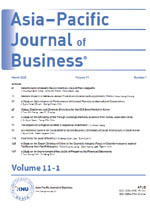비인격적 감독의 국내 연구 동향과 향후 방향성
Abusive Supervision: Domestic Research Trends and Future Research Directions: Focusing on Antecedents and Outcome Variables
- 강원대학교 경영경제연구소
- 아태비즈니스연구
- 제12권 제3호
-
2021.09295 - 328 (34 pages)
-
DOI : 10.32599/apjb.12.3.202109.295
- 110

Purpose - This study reviewed domestic empirical studies on abusive supervision published from 2009 to 2020 and summarized the accumulated results. In particular, this study classified previous studies on abusive supervision as antecedents (supervisor characteristics, subordinate characteristics, and contextual factors) and outcome variables (cognition/awareness, affection/emotion, attitude, behavior, and others). Based on the results, this study suggested potential issues of previous studies and future directions for abusive supervision. In addition, this study proposed the academic and practical implications and limitations. Design/methodology/approach - The domestic studies on abusive supervision can be divided into antecedents and outcome variables, and each study was organized into the characteristics of the supervisor, subordinate, and situational characteristics, and the resultant variables were divided into cognition/awareness, affection/emotion, attitude, behavior, and others. Finding - Prior studies on abusive supervision had several limitations in obtaining clear results with individual characteristics or fragmented approaches at the organizational level. In the future, more comprehensive approaches will be needed. Research implications or Originality - This study will provide academic and practical implications for future research on abusive supervision by deepening an understanding of the negative consequences of abusive supervision.
Ⅰ. 서론
Ⅱ. 선행연구 검토
Ⅲ. 국내 연구 동향 Review
Ⅳ. 결론
References
(0)
(0)